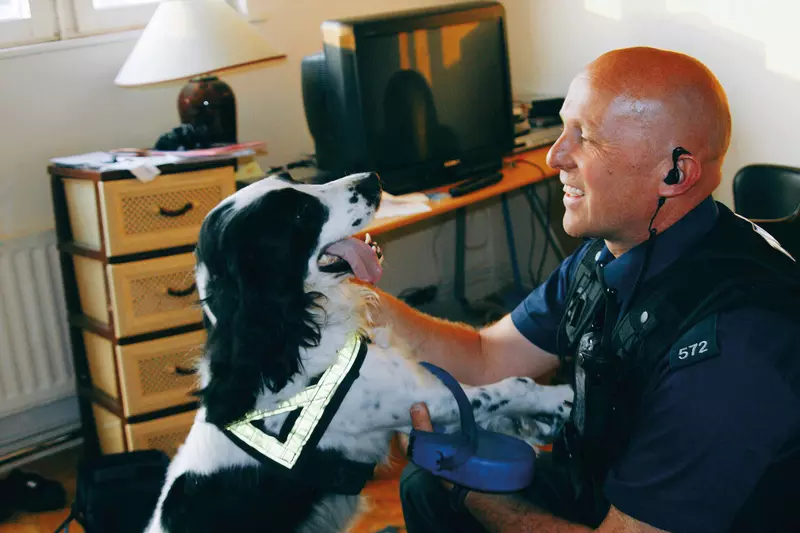Undefeatable: Paul's story
Paul Nicholls is a former dog handler with Essex Police. Here he talks about getting diagnosed with Parkinson’s, his love for dogs, and how he stayed fit during lockdown.
I was diagnosed with Parkinson’s at the age of 47, back in 2014. I’d worked with Essex police as a dog handler since the early 2000s where I helped crack cases with different loyal companions. As a very active, younger person, the diagnosis came as a shock to me.
Because of my age I was advised to seek a second opinion. The second specialist told me my symptoms were just caused by stress and anxiety. But after my symptoms got worse, I was then told that I actually did have Parkinson’s after all.
Each appointment lasted just 10 minutes. I couldn’t help but think there must be a better and more way accurate way of diagnosing the condition.
At the time, the charity Medical Detection Dogs were doing research based on dogs’ ability to detect minute odour traces created by conditions. I got in touch to talk about how sniffer dogs might be able to help. Some dogs had already been successfully trained to detect certain cancers in humans.
The project was given the green light. In the same year I was recognised with the Queens Police Medal for my work, I was the first person with Parkinson’s to give a skin swab for the project. It made total sense to utilise the dogs’ incredible skills for this amazing research.

From high to low impact
Before my diagnosis, when I wasn’t working with police dogs, I was playing football, golf or squash. But as my symptoms progressed I had to cut down on a lot of the high impact sports, as I just couldn’t manage them anymore.
Instead I discovered table tennis and walking football. They were still physically challenging but more gentle, and didn’t wear me out as much. I joined a team for each game and the social side really helped with my mood.
Then lockdown happened. All the table tennis clubs shut. Like so many others I had to try and adapt how I lived my life.
So I bought a table tennis trainer, which is a ping pong on a swing-ball that you can use at home. It meant I could still practise and keep my skills up, like maintaining a good swing with my arm. It helped keep my motor skills going.
I also made sure to try and do keepy-uppies with a football each day, and walk my beautiful rescue labrador Pad [pictured below] on the beach in my hometown of Clacton.
Just moving makes me feel better - it helps keep my muscles loose, and reduces stress
In late 2019 I heard about a campaign called We Are Undefeatable, which is a campaign run through Sport England to help people with long-term health conditions stay active.
I got in touch with them and it turned out they were looking for someone with Parkinson’s to feature in their latest campaign advert, which would be on TV. I was really keen to get involved and I jumped at the chance. In the summer of 2020 I made my first appearance on national television on their latest advert, with Pad.
The campaign is about educating people. I believe it’s important because it raises much-needed awareness. And not just about health conditions, but about the benefits of staying active.
Looking ahead
At the moment my symptoms are slowness and freezing. Recently my meds have become less effective and my specialist has spoken about deep brain stimulation, and I’m on the waiting list for surgery.
But if there’s music playing then I can dance, and I don’t freeze. I follow my wife’s feet - if she walks ahead of me, I move along with her.
So I’ll keep going and stay active for as long as I possibly can. Pad always needs walking and forces me to get out and about too.
Recently I’ve also tapped into my more creative side. I enjoy doing watercolours, especially of the beach huts where I live. I'm raising money for Parkinson's UK through the Parkinson's Art website. Painting really helps relax me and focus on the here and now.
Read more about staying active and exercising when you have progressing symptoms of Parkinson’s.

